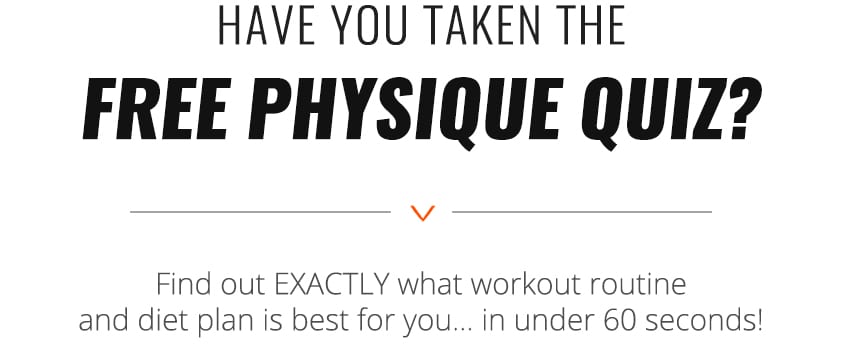Certain topics are always highly debated in the world of bodybuilding.
Pre and post workout nutrition are undoubtedly two of these things…
Some people claim that pre and intra-workout BCAA supplementation plays a big role in spiking rates of muscle protein synthesis. Proponents of intermittent fasting swear that training first thing in the morning before eating is best for enhancing energy and focus.
And supplement companies would have you believe that your muscles will catabolize and “eat themselves” if you don’t down a protein shake immediately after finishing your last set.
Who’s to believe? And what factors actually impact real-world muscle and strength gains?
In the past I’ve covered post-workout nutrition and the ‘anabolic window’, but in this article I want to dive into what current scientific research tells us about pre-workout nutrition.
What Should You Eat?
Okay, the first question we’ll answer is WHAT you should eat before a workout. Let’s take this down one macronutrient at a time.
Protein
In 2013, leading bodybuilding nutrition experts Alan Aragon and Brad Schoenfeld conducted a meta-analysis that compared over 40 recent studies to determine the effects of protein timing on muscle strength and hypertrophy. Their conclusion?
These results refute the commonly held belief that the timing of protein intake in and around a training session is critical to muscular adaptations and indicate that consuming adequate protein in combination with resistance exercise is the key factor for maximizing muscle protein accretion.
In other words, consuming a sufficient level of protein throughout the entire day is what will optimize muscle and strength gain. Manipulating the exact timing of protein consumption before and after your workouts will have a negligible impact on your results. There is no specific reason to eat a certain amount of protein before working out.
Carbs
When it comes to long duration endurance training, eating an adequate amount of carbs before working out is extremely important because glycogen (a form of glucose that serves as stored energy in your body) is likely to be depleted. Consuming those extra carbs beforehand can provide extra glucose and delay that process.
However, when it comes to lifting weights for about an hour or so, this is not an issue. If you’ve consumed an adequate amount of carbs over the prior 24 hours before your workout (the time it generally takes to replenish glycogen stores in your body following high intensity exercise), chances of depleting your current glycogen stores during a weightlifting session is minimal.
If anything, carbs are important to consume AFTER working out. This will replenish your glycogen stores for your next training session, and studies have shown consuming carbs helps raise rates of muscle protein synthesis post workout.
Fats
While fats are needed to regulate hormone production and transport throughout your body, there is no known benefit to consuming them before a workout.
In fact, fats are generally a poor pre-workout choice because they slow your rates of gastric emptying. This means that it slows down the rate at which the food you’ve consumed will make its way through your stomach.
Generally speaking, having food in your stomach during high intensity exercise is a bad thing because it can lead to an upset stomach. It’s also important to note that fiber also slows your rates of gastric emptying, and so high fiber foods should be avoided soon before working out as well.
How Long Before Working Out Should You Eat?
The second question we’ll approach is meal timing before the workout.
The most important factor here is that you eat in a way that makes you feel energized and focused in the gym. You need to be able to push yourself past your previous limits in order to get stronger and build new muscle tissue. And having a high level of energy and focus is a requirement to accomplish this.
You don’t want to feel uncomfortably full. And you also want to avoid hunger pangs.
For this reason you should avoid eating too large of a meal, too soon before working out. Also, as noted above, consuming high amounts of fats or fibers before working out is not a good idea because it slows down the rate at which food will make its way through your stomach.
If you feel like you need to eat SOMETHING and you only have an hour or so before working out, then it’s best to go with a liquid meal. Liquid meals will get through your stomach faster than solid foods. Something like a protein shake that consists of carbs and proteins (and not too many fats or fibers) is an ideal choice in this scenario.
What About Fasted Training?
The other option is to eat NOTHING before you work out. This is known as fasted training and has been gaining popularity in recent years.
Personally, I love it. And in terms of its measured effectiveness, it actually has some scientific backing. A recent study showed that training fasted can actually increase the body’s anabolic response to a post-workout meal (when compared to also eating a meal before working out). While this doesn’t prove that it will yield any measurable long term advantage, it does at least suggest that training fasted is not inferior to training with a pre-workout meal.
If training fasted first thing in the morning works with your schedule, it’s worth trying out. Check out my recent article on intermittent fasting for more on this.
Are Pre-Workout Supplements Worth It?
The last thing I want to cover here is pre-workout supplementation.
Pre-Workout Powders
Commercial pre-workout powders are super popular. And it’s obvious why – they make you feel like a fucking beast. It’s important to note that this is almost always due to the simple fact that they contain very high doses of caffeine.
Note: Some also contain creatine, but honestly it’s easier and cheaper to get a separate creatine supplement.
Caffeine can improve your focus and perceived energy in the gym, so it’s worth using if your body tolerates it well. That being said, something simple like coffee also contains caffeine without the added long list of sketchy ingredients you’ll find in most pre-workout powders. Other common pre-workout ingredients like creatine, beta-alanine, and citrulline mallate have been studied and shown to be beneficial for hypertrophy and strength gain. However, citrulline malate is the only one of these that has acute effects and needs to actually be consumed pre-workout to be useful.
If you’re interested in using a pre-workout supplement then I suggest you buy the ingredients separately, save money, and make your own pre-workout powder.
BCAAs
Branched Chain Amino Acids, or BCAAs, are another common bodybuilding pre-workout supplement. While some studies have measured increased levels of certain anabolic molecules in response to supplementing BCAAs before training, I’ve yet to see a study that proves that this leads to any measurable long-term gains in strength or muscle mass.
Again, your daily caloric intake (and your daily intake of protein) should be your focus… because these things definitely WILL have a large impact on your gains.
What’s the Verdict?
- Avoid large meals that contain high amounts of fats or fibers before working out
- Go with a liquid meal if you’re working out soon
- Test fasted training if your schedule allows for it and see how you like it
- Always meet your daily goals in terms of overall calories and protein
- Consume caffeine pre-workout for added energy and focus




Good stuff.
I have gained a tiny bit of excess fat after bulking 30lbs in my first year. I’m sitting at 180lbs/6ft tall. Plenty of mass there but my stomach is not as lean as I would like.
I have spoken to a lot of guys at the gym and the general consensus seems to be the old classic “no carbs after 6″…. so basically leaving out the rice or potatoes at dinner time.
Then on off days (Tues, Weds for me) should be very low carb or none at all?! Perhaps a small portion of oats in the morning and handful of rice a lunch time. Again… no carbs after 6.
Then weekends are generally my cheat days.
What are your thoughts on this approach?
Thanks Buster. In terms of cutting off some fat, you need to reduce overall calories so that your body is in a caloric deficit.
You can go the old school approach and cut out late night carbs if you prefer it, but as long as you get yourself down to a 300-500 daily caloric deficit, you should shed fat.
Nice short and very well summarised post, I like it. It wasn’t mentioned here, but does the importance of daily (vs. hourly) protein requirements function the same for post-workout? There’s always mentioned spruiking, “You need to consume protein within 30 minutes, otherwise your body breaks down…!” Is overall daily protein consumption more important than such ‘windows’?
Thanks Tom – check out this post I wrote on the post-workout “anabolic window”: http://www.howtobeast.com/proof-the-post-workout-anabolic-window-is-a-lie/
In general, the overall daily amounts of calories and protein are far more important vs. at any specific time.
Now this is interesting – my biggest enemy at the gym is without a doubt an upset or jumpy stomach.
I train in the evenings and usually have a couple bananas + my homemade pre-workout before.
Could it be that the fiber in the bananas or instant oats cause this?
I wish I was able to work out fasted but my strength is usually down a good 10% when I try it
The instant oats could definitely cause it if you consume them too close to the workout. It could also be the caffeine in the pre-workout (it upsets some people stomachs).
And interesting on your strength being down when you’re fasted. All of our bodies are different, that’s for sure.
You could try cutting out the oats and see if just eating the bananas still upsets your stomach. Oats, being a grain, has gluten and you may be gluten intolerant and not know it.
Fruits typically are good for digestion unless you’re allergic to bananas.
Contrary to popular belief, grains are really not good for you. Humans have no need to eat them.
I’ve always liked your preworkout man and use it before every workout. I see the author from Iron and Tweed liked it as well and totally copied it from you.
Thanks Danny. And yeah – I’ve seen a LOT of these articles pop up ever since I posted that one. I still rank above them all on Google ha!
Take in what makes you feel good. If you feel tired for the rest of the day after a workout you probably haven’t eaten enough post workout. If you feel overly sluggish 30 minutes or so after your post workout meal then you may have eaten too many carbs. Like adam said you really just need to experiment and see what works for you. As far as quick digesting carbs you could use supplements such as dextrose or waxy maize. As far as food sources you could use white potatoes or white rice.
I agree. In general with nutrition I believe people should experiment and see what they prefer (while still hitting the appropriate caloric surplus or deficit).
Thanks for sharing much information! This will help me on my weight loss journey.
Thanks for sharing much information! This will help me on my weight loss journey.